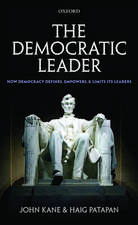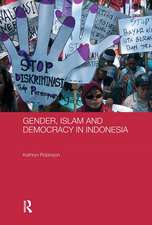Democracy in Iran: History and the Quest for Liberty
Autor Ali Gheissari, Vali Nasren Limba Engleză Paperback – 24 iul 2009
Toate formatele și edițiile
| Toate formatele și edițiile | Preț | Express |
|---|---|---|
| Paperback (1) | 155.91 lei 31-37 zile | |
| Oxford University Press – 24 iul 2009 | 155.91 lei 31-37 zile | |
| Hardback (1) | 574.98 lei 31-37 zile | |
| Oxford University Press – 27 iul 2006 | 574.98 lei 31-37 zile |
Preț: 155.91 lei
Preț vechi: 169.08 lei
-8% Nou
Puncte Express: 234
Preț estimativ în valută:
29.84€ • 32.43$ • 25.08£
29.84€ • 32.43$ • 25.08£
Carte tipărită la comandă
Livrare economică 10-16 aprilie
Preluare comenzi: 021 569.72.76
Specificații
ISBN-13: 9780195396966
ISBN-10: 0195396960
Pagini: 232
Dimensiuni: 229 x 150 x 18 mm
Greutate: 0.32 kg
Editura: Oxford University Press
Colecția OUP USA
Locul publicării:New York, United States
ISBN-10: 0195396960
Pagini: 232
Dimensiuni: 229 x 150 x 18 mm
Greutate: 0.32 kg
Editura: Oxford University Press
Colecția OUP USA
Locul publicării:New York, United States
Recenzii
A clear and readable account of politics in the Islamic Republic.
A comprehensive overview of Iran's history on its way towards democracy...shed[s] new light on already well-known facts, recombining them into an unfamiliar but conclusive shape; and on top of that is an impressive read.
Democracy in Iran unravels the jumble of paradoxes that have marked Iranian politics over the last century. The country has experienced considerable success in state-building and development but has periodically undermined both by failing to consolidate democracy. Presently, it has many of the elements of a lively democracy but, somehow, is not a democracy at all. Iranians have successfully challenged candidates supported by the Supreme Leader of the Islamic Republic but have failed to weaken clerical control of the state. Vali Nasr and Ali Gheissari do an outstanding job of explaining how Iran keeps flirting with democratic governance, more than practically any other Islamic country in the Middle East, yet somehow always seems to fall short of sealing the marriage.
A comprehensive account of political developments in Iran in the last century, theoretically sophisticated and yet very accessible. Easily the best book in a decade on Iran's bumpy road to democracy through two revolutions and much anti-democratic state-building.
Democracy in Iran is a bold and sweeping survey of the past century of Iranian political history, an absorbing drama of contending ideologies, social classes, revolutionary movements, international pressures, political factions, and charismatic leaders. Nasr and Gheissari vividly expose Iran's ongoing struggle between democratic principles of freedom and accountability, the authoritarian-modernist quest for order and development, and revolutionary idealism, both secular and religious. In the process, they show once again the folly of all forms of utopianism and the necessity of constitutional and representative government. This is not just a book about Iran, but an insightful study of how regimes rise, evolve, stagnate, fragment, and fall.
Iran is often portrayed in the West as 'despotic,' 'autocratic,' and 'totalitarian.' This lucid and succinct book is an excellent antidote to the conventional view. It narrates eloquently the history of modern Iran through the prism of democracy
A comprehensive overview of Iran's history on its way towards democracy...shed[s] new light on already well-known facts, recombining them into an unfamiliar but conclusive shape; and on top of that is an impressive read.
Democracy in Iran unravels the jumble of paradoxes that have marked Iranian politics over the last century. The country has experienced considerable success in state-building and development but has periodically undermined both by failing to consolidate democracy. Presently, it has many of the elements of a lively democracy but, somehow, is not a democracy at all. Iranians have successfully challenged candidates supported by the Supreme Leader of the Islamic Republic but have failed to weaken clerical control of the state. Vali Nasr and Ali Gheissari do an outstanding job of explaining how Iran keeps flirting with democratic governance, more than practically any other Islamic country in the Middle East, yet somehow always seems to fall short of sealing the marriage.
A comprehensive account of political developments in Iran in the last century, theoretically sophisticated and yet very accessible. Easily the best book in a decade on Iran's bumpy road to democracy through two revolutions and much anti-democratic state-building.
Democracy in Iran is a bold and sweeping survey of the past century of Iranian political history, an absorbing drama of contending ideologies, social classes, revolutionary movements, international pressures, political factions, and charismatic leaders. Nasr and Gheissari vividly expose Iran's ongoing struggle between democratic principles of freedom and accountability, the authoritarian-modernist quest for order and development, and revolutionary idealism, both secular and religious. In the process, they show once again the folly of all forms of utopianism and the necessity of constitutional and representative government. This is not just a book about Iran, but an insightful study of how regimes rise, evolve, stagnate, fragment, and fall.
Iran is often portrayed in the West as 'despotic,' 'autocratic,' and 'totalitarian.' This lucid and succinct book is an excellent antidote to the conventional view. It narrates eloquently the history of modern Iran through the prism of democracy
Notă biografică
Ali Gheissari is Professor of History at the University of San Diego. He has written extensively on the intellectual history and politics of modern Iran. His edited volume, Contemporary Iran: Economy, Society, Politics, was published by Oxford University Press in 2009.Vali Nasr is Professor of International Politics in the Fletcher School of Law and Diplomacy at Tufts University. He is the author of several books, including Islamic Leviathan: Islam and the Making of State Power (OUP 2001).













